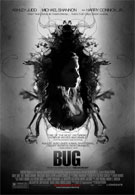Be it the fear that someone is lurking behind you in a dark parking lot or a bug is crawling on you while you sleep, there is a bit of paranoia in us all. The little seeds of fear planted in our minds by rumors and suspicion grow as we try to fill in the irrational gaps. At times, paranoia seems to make more sense than truth. There’s no more attractive and intriguing paranoia than the government tracking and controlling us. Perhaps it’s the massive power structure governments are created on or our own desire to be important enough to matter to such a powerful entity. Nevertheless, it’s these ideas that Bug explores.
Contrary to the slick bait-and-switch marketing, Bug is not some cheap fright fest that trivializes its characters and depends on extra-terrestrial bugs to drive the film’s suspense. At its core, Bug is a dismal look at both physically and emotionally abusive relationships. Agnes White (Ashley Judd) is an alcoholic drug-user whose abusive ex-con, ex-husband just got out of jail and comes back to her, mostly for cash. At the same time, she meets the soft-spoken Peter Evans (Michael Shannon) who genuinely likes her. While pushing away from her ex-husband, she pulls herself closer to Peter, despite his seemingly unbelievable past and present circumstances.
The power of Bug lies within its characters. We naturally hope the best for Agnes, though extremely flawed and consumed by despair after the loss of her son. Peter seems to have the potential to have a positive impact on her life, especially as an alternative to her abusive husband. Thanks to Tracy Letts screenplay (based on her play of the same name), the characters nor their circumstances are melodramatic. Though their actions are mostly confined to Agnes’ hotel room, the people involved are dynamic. Agnes shares her experience of loss in telling the story of her son’s disappearance. Peter comforts her and adds a hint of bizarre fascination with his ideas of technology. When the bugs finally arrive, we have already been drawn into their world, we trust them, and it makes the film all the more devastating.
Bug is a cautionary chamber piece of trusting love and endless drug use, while the majority of audience will want to see Ashley Judd ripping the “bugs” out of her skin. Predetermined expectations of what the film will be, sight unseen, destroys Bug’s chances of finding its audience based purely on our reliance on marketing. The film makes no concessions for closed-minded viewers, who will ultimately dismiss the film as boring. William Friedkin’s directing is patient and cerebral. Through his use of symbolic motifs, most notably the distant sound of a helicopter and the saturation of hot and cold temperatures, he plays on our genre expectations. Most of all, Friedkin is patient. He grows his character’s paranoia as he grows our own. He plants the seeds of trust from the very beginning and betrays it; in a sense, bringing us closer to Agnes by having us endure her very same emotional journey.
It’s unfortunate that an excellent film will be shrugged off and forgotten before it has a chance. The marketing machine of Hollywood has played to the horror audience’s blood lust. Once it has betrayed that audiences trust by not delivering what it promised in its trailers, Bug will quietly leak out of theaters and onto video to be archived as a one-trick pony or another cruddy Ashley Judd movie. Perhaps the programmed cybernetics paranoia found in Bug isn’t too far off, in that we are already programmed into accepting common cinematic formulas and predictable franchises.
Your Daily Blend of Entertainment News

